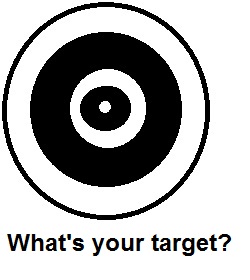Practice Vocabulary for Achievement and Goal-Setting

We use our vocabulary for achievement in so many ways when we talk about how to reach our goals-- or even which goals are worth achieving. They're important for business planning as well as in personal life.
Here are some example sentences and a couple of vocabulary activities to practice important words related to goals.
You might not know a few of these words. That’s O.K. (This isn’t a test!) It’s just a chance to play around with the words. Take a guess, then scroll to the bottom of the page to check your answers and see explanations. The purpose of these games is to make it easier to recognize these words when you see them again.
Example Sentences
"The graduate and his parents were proud that he had achieved his goal. That made all his efforts and their financial sacrifices worthwhile!"
"Our organization’s goal is to raise enough money to be well-established and financially secure. However, we are financially unstable currently, and we must operate within severe budget constraints." (That means they need to be very careful with their limited money until their finances stabilize.)
"Sales people often receive financial incentives such as bonuses (extra pay) if they meet or exceed their targets (goals) for the month."
A resolution is a statement of one’s purpose to work
toward a goal. We can resolve to lose weight or to learn a new language. Resolve and resolution can also be used when
people find a solution to a problem. For example: “The conflict was resolved by
changing the date of the meeting.”
Resolve can also be used as a noun meaning 'determination'-- that a person has decided something and will not change. For example: "His firm resolve was to finish the marathon even if he had to crawl the last mile."

The Goal Planning Process:
1. Identify the goals you want to reach. (It’s O.K. to aim high, but be realistic.)
2. Establish specific, measurable, criteria (standards to judge by) so you can recognize when you have attained them.
3. Plan the steps necessary to achieve those goals.
4. Carry out your plan.
________________________________________________
Activity 1: Odd One Out
All of these words but one have very similar meanings. Which is the odd one that does not mean the same?
1. accomplishment, achievement, attainment, establishment
2. goal, image, objective, target
3. decide, hope, intend, resolve
4. constraints, limitations, objectives, restrictions
5. before, eventually, previous, prior
6. definite, precise, general, specific
7. benefits, criteria, requirements, specifications
Vocabulary for Achievement 2: Matching
Instructions: Match words in column 1 with their meanings in column 2. Then click on "Check."
| accomplished | ||
| constraints | ||
| criteria | ||
| financial | ||
| identified | ||
| resolve | ||
| specific | ||
| target |
Answers
Activity 1. The Odd one is:
1. establishment (The others all involve reaching a goal:
getting what you wanted.)
2. image (The others are all goals to aim for.)
3. hope (The others all show a definite purpose to work
for something, not just a desire for it.)
4. objectives (The others are all limits on what you can do.)
5. eventually (The others all talk about something that occurred--happened-- earlier.)
6. general (The others all describe one thing in
particular, not just anything similar. General is actually the opposite of
specific.)
7. benefits (The others are all words for a list of the exact things someone is looking for.)
Home> How to Learn Professional Vocabulary > Vocabulary for Achievement.
Didn't find what you
needed? Explain what you want in the search box below.
(For example, cognates, past tense practice, or 'get along with.') Click to see the related pages on EnglishHints.
| site search by freefind | advanced |





